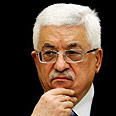
Mahmoud Abbas. Hopeful
Photo: AFP

Khaled Mashaal. 'Hamas will not oppose unity'
Photo: AP
A few days ago, official Egyptian
sources rushed to announce that August 25th, 2009 will be “Palestinian Unity Day.” A reminder to those who forgot: Representatives of the various Palestinian factions have been in Cairo for long months (and maybe years,) alongside Egyptian mediators, but are having trouble signing a basic memorandum of understandings that would eventually prompt the formation of a “Palestinian national unity government.”
The Egyptians, with American assistance, tried almost everything in order to secure this end result. American and European pressure was exerted on Israel on various issues, mostly in respect to the outposts and settlements; generous aid packages were promised, including a multi-million grant earmarked for “rehabilitating Gaza,” with an explicit obligation to provide an unprecedented sum of money to be deposited in a joint account…yet the prospect of a unity government keeps on distancing.
There is no doubt that the dramatic Egyptian announcement regarding the seeming “closing of ranks” within Palestinian society is mostly a desired outcome and expression of hope, or even a transparent media spin that aims to atone for longtime frustration, more than it is a fact or the realization of a vision.
We should recall that representatives of the greatest Arab power, topped by Intelligence Minister Omar Suleiman, are perceived as a paper tiger in the Arab world. Their repeated failures to secure compromises between two marginal Arab groups, Fatah and Hamas, are met with a disparaging response. “What happened to the great Egypt?” the Arabs ask. “Can’t a lion facilitate reconciliation between two foxes?”
It would be good for the Egyptians, as well as for those who promote “Palestinian unity” – the Europeans and Americans – to realize that their current efforts are doomed for failure. The notion of Palestinian unity is largely a paradox. The Palestinian public was never cohesive and united, and there is great doubt in respect to the prospect of future unity.
In the past 100 years, this public was the epitome of a split and divided society that has trouble giving rise to leadership accepted by all factions. For that reason, this society has entrusted its fate in the hands of foreign elements and encouraged foreign intervention, instead of taking the reins.
Sign of upcoming upheaval
Historians who research Palestinian society tend to point to this public as a classic example of separatism and factionalism that prevent any genuine possibility of manifesting national aspirations, including the desire for independence. Even Arab and Palestinian researchers expressed public reservations over the well-renowned Palestinian “sense of family” and “tribalism,” which averted the possibility of getting rid of foreign occupiers such as the Ottoman, British, and Jordanian administration, instead serving them as submissive slaves.At their time of distress, and in the framework of their ceaseless efforts to prove to the US and Europe that despite all the grim predictions there is Palestinian hope, Mahmoud Abbas’ people are pointing to August 4th, the date of the upcoming Fatah convention, as a decisive date. “The Fatah and only the Fatah will decide whether we’ll be going for unity,” say the followers of the secular-nationalist camp. “Hamas will not thwart unity,” Khaled Mashaal rushes to declare from Damascus. Cynics in the territories are saying that this time we may see peace secured between the settlers and Hamas, but never between Fatah and Hamas. The division resonating in the declarations of both sides is already outlining the next collision course.
The recent attack carried out by Hamas during the wedding of the Fatah’s Dahlan family in Gaza is merely the first indication of the upcoming upheaval. The vendetta for the massacre of June 2007 in Gaza will come, Fatah members threaten.
Some will say that Palestinian factionalism in this decade is manifested through the ideological clash between the secular-nationalist camp and the religious-fundamentalist camp (Fatah-Hamas.) Indeed, this is the openly visible rivalry. Yet the backdrop for the hidden and real conflict is a little harder to identify; that is, the conflict over the core issues.
The true confrontation is over what should be the top issue on the national agenda: The right of return, or the need to cling to the land. That is, it pits those who demand the removal of settlements and the retaking of that land against those who demand a return to the Israeli homes they were expelled or fled from.
And for those who wonder why the Americans show such great insistence on placing the removal of outpost and a settlement freeze at the top of their demands from Israel, the explanation is simple: The practical expression of the focus on clinging to the land is the outposts and settlements. And so, Obama has already decided – he will not pressure Israel on the issue of the right of return, but the Israelis will pay for this with giving up their insistence to cling to the land, that is, the settlements.
Israeli agreement to this will keep Obama satisfied. However, again we will only see half the Palestinian public accept this approach.
Colonel (res.) Moshe Elad served in various senior posts in the territories. At this time he serves as a lecturer at the Western Galilee Academic College















